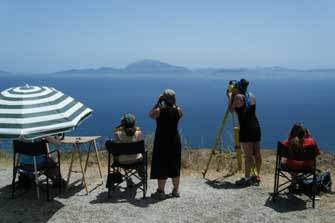 |
| (Photo: europasur.es) |
TARIFA Some 25 volunteers working with Circe (Conservación, Información y Estudio sobre Cetáceos) are presently taking part in the seventh campaign that watches for finback and sperm whales from land. The main objective is to evaluate the risk of impact with the large vessels that cross the Strait of Gibraltar. This is the fourth year the study has been carried out, with a total of about 400 participants from numerous countries, who have found, identified and followed up on these whales, two of many species that come through the straits each season. Pauline Gauffier, who coordinates the event, says that>>>
volunteers from Spain, Greece.Cyprus Belgium France and Italy are taking part this time. "We will continue to find new animals and follow them up," she says.
volunteers from Spain, Greece.Cyprus Belgium France and Italy are taking part this time. "We will continue to find new animals and follow them up," she says.
"After four years we have been able to observe that as many of them come through in summer as in winter, which leads us to believe that there may be a small colony of finbacks using the southern part of the peninsula as their permanent home, feeding off the Atlantic side in summer and possibly reproducing in the Mediterranean in the winter, given the large number of mothers and babies coming from the Med from May to July.
This is the time of year when it is best to observe them from land as they come in close to the Spanish shore - the opposite of what happens in the winter. This makes it easier to follow those marked with satellite markers, which data, when put through a computer programme, enables their route to be followed, and therefore to establish where they are feeding, mostly on krill (minute 'gambas')
The other large sea mammals that come through regularly, are the sperm whales. These are also impacted by shipping traffic, although there have been considerably less summer sightings over the last few years.

No comments:
Post a Comment